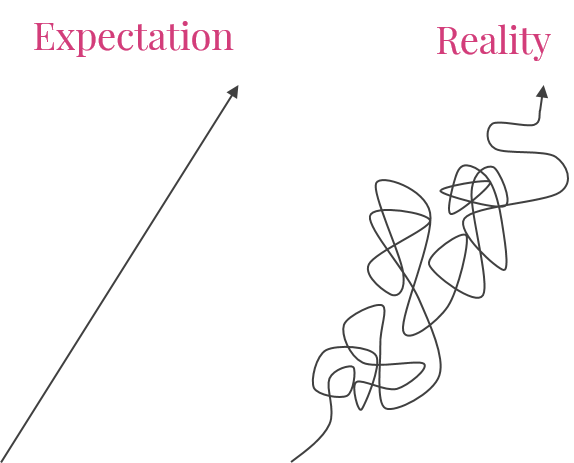You might be focused on raising awareness and brand signalling, or maybe you are aiming to grow your business through online sales or increasing your website leads. Depending on your industry, vertical or business goals, your KPIs are likely to be different from other organisations and competitors.
The goals and targets you’re aiming for may seem to be miles away. If they’re unreachable, maybe it’s time for a digital marketing review. Perhaps the goals that you’ve set just aren’t realistic.
The biggest problem in life is the image in our heads of how things should be.
In an ideal world, a user would visit your website from any source and take the desired action on their first visit. Unfortunately, this rarely (never?) happens. The world we now live in, with the multitude of devices, channels, on and offline sources, all combined into one user journey, means that this just doesn’t happen. And that’s just a handful of the possible touchpoints in one individual user journey.
All of this isn’t uncommon knowledge – think about the path you take before making a purchase or signing up to something online. How often, honestly, do you convert on the first visit to a website?

The expectation is that it’s going to be a straightforward journey. But in reality; it rarely is.
With online marketing, it’s all about testing, trying new things, understanding the data, analysing the results, learning from it, and making decisions based off of that.
You may have a great idea for a campaign, you invest budget into it and it doesn’t work. Well, sh*t happens.
Learn from it, understand what went wrong and what can be done about it. It might be your audience targeting; it might be your keyword targeting; it might be your ads; it might be your website or it may be a combination of the above. Whatever it is, don’t get bogged down but instead use it as a learning opportunity to develop and improve your campaigns.
Top tips for setting realistic goals for your business
1. Figure out what your long term aim is
Whatever your goals are; profit, expansion, selling the business, etc., where do you see the company in a year? What about 5, 10, 15, or 20 years? Once you have a clear vision, how do you plan to get there? If you’re working with a marketing agency; are they a part of the future vision? If not – why not? The marketing team (in-house or external) should be included within your future plans. After all, they’re there to help you get to where you want to be.
2. Now think about what your short term goals are
Once you have your long term objectives, setting short term goals can help you to map out how you’ll achieve the long term goals. By mapping it out, you’ll have a much clearer vision of how to get there and how long it might take. Each short term goal you achieve can be ticked off, meaning you’ll feel a step closer to the long term aim.
Set out targets and KPIs for the marketing team along with your own timeframes and review them regularly, together, to keep on top of the performance. If things are taking longer than projected or deadlines aren’t being met, review this together to really understand why, and what can be done about it.
3. Stay focused
You’re not likely to achieve your goals overnight. If it was that simple, we’d all be laughing (and rich). But if you’ve set realistic goals and mapped out how you plan to get there, stay focused.
Don’t lose sight of where you said you wanted to be. It is sometimes a good idea to have a regular time to revisit the goals and KPIs and re-assess whether you are on track. It might take some time to get there, it may not be an easy ride, but keep focused.
What comes easy won’t last, and what lasts won’t come easy.
4. Who do you need to help you get there?
Even the most confident of us should know the gaps in our skills. Make sure you are employing or hiring the right team to support you. If you are lacking in digital marketing skills – engage the experts. If you’re terrible at data analysis and reporting, make sure you invest in those areas. If your budget planning and marketing strategies are weak, find the best you can afford to plug the gap.
Once you have the right team, either internally or externally, make sure you regularly ask yourself the following:
- Are you all on the same page in regards to the goals and KPIs? Be 100% clear as this can often be where a whole campaign falls down due to miscommunication.
- Is your agency or in-house team being honest with you?
- Did they set and manage your expectations?
Your team should be able to explain the good and bad news to you. They should be able to support and execute the areas they are responsible for. If that’s not the case, then you need to review if they are the right fit for your business. Not all agencies or internal marketing teams are right through your whole business journey. Sometimes you need to change as you grow.
Keep going, keep growing
If, after reading this, you still feel that your end goals are achievable but you need some help to get there, we can help with your strategy planning.







